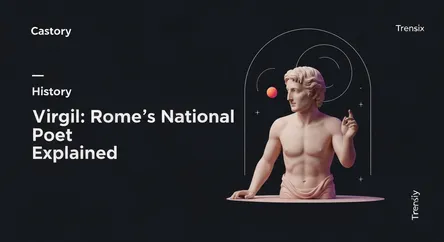History
Virgil: Rome's National Poet Explained

An overview of Virgil, the legendary Roman poet whose epic, the Aeneid, shaped Rome's national identity and influenced Western literature for millennia.
What is it?
Publius Vergilius Maro, known as Virgil (70-19 BCE), was ancient Rome's most celebrated poet. Living during the transformative reign of the first emperor, Augustus, Virgil composed three of the most influential works in Latin literature: the Eclogues, the Georgics, and his unfinished magnum opus, the Aeneid. The Aeneid is an epic poem that tells the story of the Trojan hero Aeneas, who escapes the fall of Troy to journey to Italy, where his descendants would eventually found Rome. Commissioned by Emperor Augustus, the poem served as a foundational myth for the Roman Empire, linking its origins to the heroes of Greek legend and proclaiming its divine destiny to rule the world.
Why is it trending?
Virgil's work remains a cornerstone of classical education and Western literature, continually studied for its artistic perfection and historical significance. His poetry is not just a relic; it provides critical insight into the Roman psyche, the transition from Republic to Empire, and the use of art as propaganda. The Aeneid masterfully blended mythology with Roman history, establishing a national identity and celebrating virtues like pietas (duty) through its hero, Aeneas. This narrative was so powerful that Virgil's poetry became a standard school text almost immediately after its publication and has remained influential ever since.
How does it affect people?
Virgil's influence on culture is immense and enduring. For the Romans, he was their national poet, whose work unified the people under a shared, heroic past. For centuries after, his poetry was central to education in Europe. His impact on later writers is profound; Dante Alighieri chose Virgil as his guide through Hell and Purgatory in The Divine Comedy, and his epic structure shaped works like John Milton's Paradise Lost. Virgil's portrayal of heroism, the costs of war, and the burden of destiny continues to resonate, making his work a timeless exploration of the human condition and the foundations of civilization.